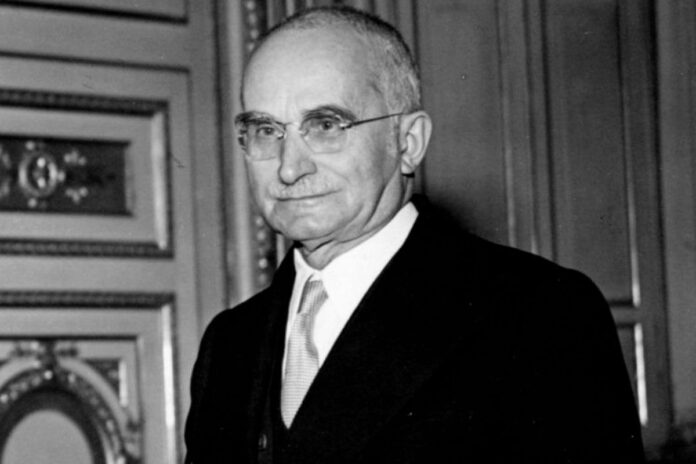Luigi Numa Lorenzo Einaudi ( 24 March 1874 – 30 October 1961) was an Italian politician and economist. He served as the President of Italy from 1948 to 1955 and is regarded as one of the founding fathers of the Italian Republic.
Explore the life of Luigi Einaudi, an influential economist and Italy’s former President. Learn how his leadership and economic reforms shaped modern Italy.
Introduction:
Luigi Einaudi was a man of vision, intellect, and leadership who played a pivotal role in shaping post-war Italy. As one of the most respected figures in Italian history, his contributions to the country’s economic policies and governance have left a lasting legacy. From his tenure as President of Italy to his work as an economist, Einaudi’s impact on Italian society cannot be overstated. In this article, we’ll explore his life, his achievements, and how his reforms continue to influence Italy today. Whether you’re a history buff, an economics enthusiast, or just curious about Italian leadership, this article offers a comprehensive look at Luigi Einaudi’s lasting influence.
Early Life and Education
Born into a Changing Italy Luigi Einaudi was born on March 24, 1874, in the small town of Carrù, in the Piedmont region of Italy. His early years were shaped by Italy’s unification and the turbulent political landscape of the late 19th century. Einaudi’s education, primarily focused on law and economics, began at the University of Turin, where he excelled academically.
Intellectual Foundations Einaudi’s deep interest in economics led him to study the works of classical economists such as Adam Smith and David Ricardo. His time at university was pivotal, not only for his academic growth but for shaping his future contributions to Italy’s financial and political systems. After completing his education, Einaudi went on to become a respected economist, writing influential works on monetary policy, the role of the state, and the importance of liberal economic principles.
Einaudi’s Economic Contributions
The Advocate for Fiscal Reform Einaudi’s career as an economist was marked by his advocacy for fiscal discipline and monetary stability. As a leading figure in Italian economic circles, he worked tirelessly to promote sound financial practices that would strengthen the country’s post-war economy. Einaudi’s work in the early 20th century laid the groundwork for Italy’s transition from an agrarian economy to a more industrialized nation.
The Role of the Bank of Italy One of Einaudi’s most significant roles came in 1945 when he was appointed Governor of the Bank of Italy. During his tenure, he made a series of important decisions to stabilize the Italian lira and combat inflation, which was a major issue following World War II. Einaudi’s policies were crucial in restoring confidence in Italy’s financial system and promoting economic growth in the aftermath of the war.
Luigi Einaudi’s Presidency
A Statesman at the Helm In 1948, Luigi Einaudi was elected as Italy’s second President, following the death of Enrico De Nicola. His presidency, which lasted until 1955, was marked by his commitment to maintaining democratic values and fostering national unity. As president, Einaudi worked to strengthen Italy’s political institutions, advocating for reforms that would protect civil liberties and support Italy’s development within the broader European context.
Political Neutrality and Integrity Einaudi’s approach to politics was grounded in integrity and neutrality. He believed that the role of the president should be above party politics, serving as a unifying figure for the Italian people. His presidency is often remembered for his calm, dignified leadership during a period of political instability and economic challenge. His ability to maintain a neutral stance helped to ensure the stability of Italy’s fledgling democracy.
Economic Reforms and Lasting Impact
The Legacy of Liberal Economic Thought Throughout his career, Einaudi advocated for free-market principles and minimal state intervention in the economy. His support for liberal economics was a key factor in the modernization of Italy’s financial systems. Einaudi’s ideas continue to influence contemporary economic policies, both in Italy and globally.
Strengthening Italy’s Role in Europe Einaudi’s contributions extended beyond Italy’s borders. As a strong proponent of European integration, he played a significant role in Italy’s post-war recovery, helping to position the country as a key player in the European Economic Community (EEC). His efforts in international diplomacy contributed to the reconstruction of Italy’s economy, making him one of the key figures in the formation of modern Europe.
Luigi Einaudi’s Personal Philosophy and Legacy
An Advocate for Social and Economic Justice Luigi Einaudi was not just a political leader; he was also a philosopher who believed in the principles of justice and equality. His writings often emphasized the importance of human rights, individual freedoms, and the need for economic policies that benefited all segments of society. Einaudi’s legacy is one of intellectual rigor, moral clarity, and a deep commitment to the principles of democracy and social justice.
Honors and Recognition Einaudi’s work earned him numerous accolades and honors during his lifetime and posthumously. He remains an iconic figure in Italian history, celebrated for his contributions to economics, politics, and European unity. His image continues to appear on Italian banknotes, a testament to his enduring influence on the country’s financial system.
FAQ: Frequently Asked Questions About Luigi Einaudi
1. What were Luigi Einaudi’s main contributions to Italy’s economy? Einaudi’s key contributions included advocating for fiscal discipline, stabilizing the Italian lira, and promoting liberal economic principles. He played a critical role in Italy’s economic recovery after World War II.
2. How did Luigi Einaudi impact European integration? Einaudi was a strong advocate for European unity and worked to position Italy as a leading member of the European Economic Community (EEC), contributing to the formation of modern Europe.
3. What was Einaudi’s presidency like? Einaudi served as Italy’s second President from 1948 to 1955, where he maintained political neutrality and worked to strengthen Italy’s democratic institutions during a time of post-war recovery.
4. Is Luigi Einaudi considered a philosopher? Yes, Einaudi was also a philosopher who believed in social justice, human rights, and the importance of individual freedoms in economic policies.
Wrapping Up
Luigi Einaudi’s legacy is one of intellectual leadership, economic reform, and unwavering commitment to Italy’s democratic principles. His life and work offer valuable lessons for contemporary policymakers, reminding us of the importance of fiscal responsibility, political integrity, and social justice. Whether through his contributions as an economist, president, or philosopher, Einaudi’s impact continues to resonate in Italy and beyond.




